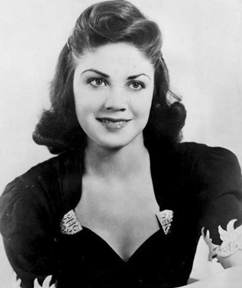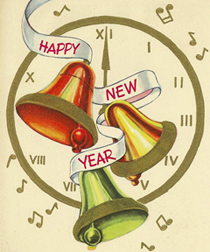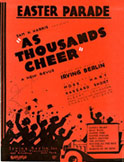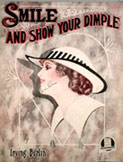Here are 10 things you should know about Betty Grable, born 107 years ago today. Known for her shapely legs, she once said, “I became a star for two reasons, and I’m standing on them.”
Tag: Harry James
Happy birthday, Kitty Kallen!
 Sadly, there aren’t terribly many performers still with us who enjoyed success during the Cladrite Era—all the more reason, then, to celebrate songbird Kitty Kallen‘s 93rd birthday.
Sadly, there aren’t terribly many performers still with us who enjoyed success during the Cladrite Era—all the more reason, then, to celebrate songbird Kitty Kallen‘s 93rd birthday.
Kallen, born Katherine Kalinsky in 1922 in Philadelphia, sang on the radio as a child on a program called The Children’s Hour, which was sponsored by Horn and Hardart, the Automat people, and as a teenager, she had occasions to sing with the big bands of Jan Savitt (in 1936), Artie Shaw (in 1938), and Jack Teagarden (in 1940).
At 21, she replaced Helen O’Connell as the singer for the Jimmy Dorsey Orchestra, primarily performing duets with Bob Eberly. After Eberly entered military service in 1943, Kallen joined the Harry James Orchestra, with whom she sang on several hit songs, including two—“I’m Beginning To See the Light” and “It’s Been a Long, Long Time”—that reached #1 on the charts.
But Kallen’s career didn’t end when the big band era did. Her 1954 hit, “Little Things Mean a Lot,” was number one in the U.S. for nine weeks and remained on chart for nearly seven months, selling more than two million copies in the process. She had many more hits throughout the 1950s and early ’60s
She also appeared frequently on television, on Broadway in Finian’s Rainbow, in many of the world’s top nightclubs and in at least one motion picture. On her final album, Quiet Nights, she sang in the bossa nova style. A lung ailment would eventually force her retirement, but Ms. Kallen is still with us and we sincerely hope she enjoys a wonderful birthday today.
10, 9, 8, 7, 6, 5, 4, 3, 2, 1 … Happy New Year!
 Well, it’s New Year’s Eve Eve. Just two more days, and we’ll all be cursing ourselves for writing 2011 on our checks.
Well, it’s New Year’s Eve Eve. Just two more days, and we’ll all be cursing ourselves for writing 2011 on our checks.
With just a few hours remaining till the ball drops in Times Square, toasts are raised, and midnight smooches are shared, we thought we’d make a present to the Cladrite community of All Star New Years Dancing Party, an hour-long radio program that originally aired on the Armed Forces Radio Service on December 31st, 1945.
The program, which is hosted by Harry James, features performances from across the country and around the world by such legendary big bands as the Count Basie Orchestra in New York City, Freddy Martin‘s outfit performing from Los Angeles’ Cocoanut Grove night club, Woody Herman and His Orchestra in New Jersey, Louis Armstrong and His All-Stars from Club Zanzibar in Manhattan, and many more.
It’s a fine way to welcome in a brand new year.
All-Star New Year’s Eve Dancing Party—12/31/1945 (1 hr., 4 sec.)
A Berlin Parade
As a small Easter egg for the Cladrite Radio community, we thought we’d offer the following:
 Did you know that the lovely Irving Berlin standard “Easter Parade” is a reworking of an earlier Berlin tune? It’s true. In 1917, Berlin wrote a song called “Smile and Show Your Dimple.” It was recorded by Sam Ash, recording artist and Broadway star (he also played dozens of bit parts in pictures), but that recording didn’t catch on with the public, so in 1933, when creating the score for the Broadway musical revue “As Thousands Cheer,” Berlin revisited the song, composing new lyrics and tweaking the melody a bit to create the song that is still so well known today.
Did you know that the lovely Irving Berlin standard “Easter Parade” is a reworking of an earlier Berlin tune? It’s true. In 1917, Berlin wrote a song called “Smile and Show Your Dimple.” It was recorded by Sam Ash, recording artist and Broadway star (he also played dozens of bit parts in pictures), but that recording didn’t catch on with the public, so in 1933, when creating the score for the Broadway musical revue “As Thousands Cheer,” Berlin revisited the song, composing new lyrics and tweaking the melody a bit to create the song that is still so well known today.
 Just as a bit of trivia, “Easter Parade” was introduced in “As Thousands Cheer” by Marilyn Miller and Clifton Webb.
Just as a bit of trivia, “Easter Parade” was introduced in “As Thousands Cheer” by Marilyn Miller and Clifton Webb.
So we’re sharing a 1933 recording below of Webb singing the song backed by the Leo Reisman Orchestra, along with a 1942 Harry James rendition, a 1939 recording by the Guy Lombardo and His Royal Canadians, Bing Crosby singing the song backed by the Victor Young Orchestra in 1948, a Gene Austin recording from 1933, and Sam Ash‘s 1918 recording of the song that fostered “Easter Parade,” “Smile and Show Your Dimple.”
“Easter Parade” — Clifton Webb with the Leo Reisman Orchestra
“Easter Parade” — Harry James and His Orchestra
“Easter Parade” — Guy Lombardo and His Orchestra
“Easter Parade” — Bing Crosby with the Victor Young Orchestra
